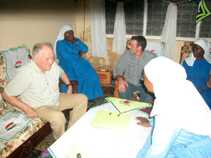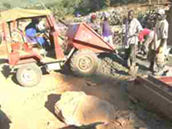


| We ask for the prayers and support of all our friends and people of good will to us. The various Agents of services and mission in the Archdiocese are undertaking a lot of projects for the human promotion through pastoral, social and economic development programs. |
| Among these projects and programs are the following: |
| Pastoral Projects |
| The Archdiocese is just working hard to build Outstation Churches for Villages where the faithful have had not house of prayer. Among these projects we have: The new Church for Luyangweni Village in Litapwasi Parish, the Outstation Church for Mchomoro Village in the diaspora part of the Diocese in Namtumbo Parish, right on the road to Tunduru, 100 km east of Songea township, the Outstation Church of Mateka in Matogoro Parish and the Multipurpose Hall in Msamala in Bombambili Parish. Other Projects of similar nature are: The Building of the Priests and Sisters House in Mjimwema Parish. The Augustinian Fathers in Mahanje are undertaking the founding of the new Parish in Madaba township due to the rapid growth of the christian population in that area. The Vincentian Missionaries in Bombambili are building an Outstation Church also in in Masigira Village. Repair works on the Parish House and the Church are to start in Ifinga Parish. The Parishioners and friends of Kitanda are embarking on the repair and extension of the Parish Church of Kitanda. We are very grateful to our friends in St. Martin Parish in Germany. In Matogoro Parish the Parishioners are almost finishing the repairs of the walls and floor of their Church. We would like also to start work of building Igawisenga Outstation Church as well as Likarangiro. Much will depend on the initiative and enthusiasm for work of the people of the respective villages. |
 |
 |
 |
| The Village has 400 catholics, and they have now where to pray. They use this hut. The Parish, Fr. Martin Prieststanding there has just arrived by motorbike. Let us build a Church. | Another delapidated Outstation church where we have to build a new one. | These are the delapidated walls of Ifinga Parish. A serious and heavy repair is required. Let us start in 2004. |
| For Education |
| The on going construction and Building of the Centenary Secondary School in Songea township. This is a project undertaken by the office of the Archbishop. It is a two story building. So far the first floor is almost complete. We have to start with the second. While we continue with the construction work, we shall nevertheless start operating by recruiting Form One students in the old building where we had prepared two class rooms. |
| The building of the Library and Dormitory for the Seminarians of Form V and VI in Lighano Seminary. For lack of funds we had to stop this work just at the foundations. We had started also to build the stable for the cows of the seminary. We finished with the walls but failed to get funds to finish the roofing. |
| Chipole Sisters are still struggling to finish the buildings of the Girls Secondary School. Thanks to God, through many benefactors they have managed to finish with classrooms, with dormitories, and soon they will complete the building of the Refectory. On 22nd January, the day after St. Agnes Feast, we blessed the buildings to allow the 380 girls to enter the premises. They are now schooling in the new buildings. |
| The Daughters of Mary Immaculate Sisters are intending to start building a Polytechnic School in Songea town in the area of Mshangano. Before that, on 12th February they will inaugurate a Computer learning centre near the Diocesan Youth Centre in Songea. |
| While the Archdiocese, in collaboration with other dioceses, will continue animating the people to collect funds for the establishment of SAUT at Iringa, we shall continue studying the possibility of getting organisations interested in establishing a college or colleges for various degrees here in Songea. |
| Hydro Electric Power Station |
| Our diocesan Sisters at Chipole, poor and simple as they are, are strongly determined soliciting funds and moral support for realizing and implementing the project of constructing a Hydro-electric plant on the Ruvuma River at Lupilu. So far the preparations of clearing the riverbed and surroundings is over. We hope by April or May serious works of constructing the Dam and power house will start. It is an expensive project, but seriously needed for the emancipation of the population of villagers and students in Chipole and surrounding villages of Magagura and Lusonga. For us it means a struggle from dark ages of a dark continent to an era of light and serious work. One should note that in the entire archdiocese there is no electricity except in Peramiho, Wino and Songea town. All the Parishes are in the dark, all the schools we have started are still in the dark. Energy for light and energy for water will liberate us and will empower our people. |
 |
 |
 |
 |
| Work of clearing the River Bed for the site of the Dam. Work has started on the Ruvuma River Site for Hydro-electric Plant. | Our Sisters are doing it. Friends do support them. We ask for more support. Let us join hands for future generations. | Mr. Robert Fuchs from Switzerland has joined us in asking for hands to help us implement the Project. | A difficult task ahead of us. It has started in May 2004 |
 |
 |
 |
 |
 |
| This is on 24th June: The Chinese contractor | Workers bring concrete mixture to the site for Dam |
The Dam begins to be in place. Already four Meters high. It will be 15m high |
Preparations for foundation of Turbine House. It will be there. It must be further excavated |
| Projects for Health | |||
| We are coordinating all our organs in the Archdiocese in order to work on a common front and with common strategies against HIV. Our Hospital in Peramiho, our dispensaries, together with our various Religious Communities are embarking on a serious house based care and as far as possible on a curative program also. Above all we want to be effective in counseling and moral animation to help our people inculcate a life with a philosophy of values instead of living at randum and in a lax manner. This year we shall inaugurate three new dispensaries in the rural areas: Liganga Dispensary, Mkongotema Dispensary and Mkongo Dispensary. We are very much indebted to Br. Dr. Ansgar Stufe OSB, Procurator in St. Ottillien for the plans he laid for us and for the support he had given us in the past and at present. We shall increase the number of HIV orphans whom we support through the provision of school materials like exercise books, rubber shoes, uniform, writing stationaries, etc. So far we are supporting already about 1400 children in the various primary schools in the Archdiocese. HIV is a serious problem. We shall soon be having more orphans than parented children. |
| For Agriculture |
| This year we shall launch a Tractor Hire Service Project whereby village farmers can borrow our tractors for cultivation, harrowing, collecting their harvested crops, etc. We have five Tractors in place for this project. We are convinced that the empowerment of the simple farmer will lead to great and secure social emancipation. Moreover, through our youth program which is going on in Mahiwa, Msalaba Mkuu, we shall visit farmers in some villages to teach them on sustainable agriculture and cheap cost house construction. The Diocese is also working hard in the line of selfsupport through agricultural projects. The Administration of the Diocese has opened a 47 Acres maize farm in Lipaya Village and an orchard for various fruits in Ngondime near Ruhuwiko. In Liganga farm we are raising about 200 heads of cattle. Fr. Xaver Komba, Parish priest of Mjimwema has made great efforts in planting trees in almost all the villages of Songea and Mjimwema Parishes. He has also opened a tobacco farm of 13 acres as well as some acres of rice padies. We would like to start a coffee farm in the highlands of the Archdiocese i.e. in Wino area. | |||
|
RADIO MARIA IN SONGEA and COMPUTERS |
|||
 |
 |
||
|
Livestock: Cattle farm of the Sisters of Chipole at Ruvuma. |
New Rice Pads in Namatuhi Village |
Maize farm of the Archdiocese in Lipaya
|
| Other |
| For water: Boreholes in various villages, the HEIFER project for providing a cow per family for milk to improve the health of our people and of families. |